In Focus
- International Protection Considerations with regard to people fleeing the Syrian Arab Republic, Update IV, 27 November 2015
On 27 November 2015, UNHCR released an Update to the International Protection Considerations with regard to people fleeing the Syrian Arab Republic (Update IV).
This paper supersedes UNHCR's October 2014 International Protection Considerations with regard to people fleeing the Syrian Arab Republic, Update III.
- UNHCR Position on Returns to Libya - Update I, 25 September 2015
In October 2015, UNHCR released an Update to the Position on Returns to Libya.
This paper supersedes UNHCR's November 2014 Position on Returns to Libya.
- International Protection Considerations Related to the Developments in Ukraine – Update III, 24 September 2015
On 24 September 2015, UNHCR released an Update to the International Protection Considerations related to developments in Ukraine.
This paper supersedes UNHCR's January 2015 International Protection Considerations Related to the Developments in Ukraine - Update II.
- UNHCR Eligibility Guidelines for Assessing the International Protection Needs of Asylum-Seekers from Colombia, 22 September 2015
On 22 September 2015, UNHCR released a new set of Eligibility Guidelines for assessing the international protection needs of asylum-seekers from Colombia. They replace the May 2010 Colombia Eligibility Guidelines.
- The former Yugoslav Republic of Macedonia As a Country of Asylum, 14 August 2015
Observations on the situation of asylum-seekers and refugees in the former Yugoslav Republic of Macedonia
- I Am Here, I Belong: The Urgent Need to End Childhood Statelessness, 01 August 2015
On the 1st anniversary of the #IBelong Campaign to End Statelessness, UNCHR launches a new report on the devastating impact of childhood statelessness, based on the testimonies of more than 200 stateless children and youth around the world.
- Guidelines on International Protection No. 11: Prima Facie Recognition of Refugee Status, 24 June 2015
These Guidelines set out the legal basis as well as procedural and evidentiary aspects of applying a prima facie approach
- UNHCR Manual on the Case Law of the European Regional Courts, 04 June 2015
A concise and comprehensive thematic guide to the case law of the European Court of Human Rights (ECtHR) and of the Court of Justice of the European Union (CJEU) that is of relevance to refugees, asylum-seekers and stateless persons.
- Summary of Deliberations on Credibility Assessment in Asylum Procedures, Expert Roundtable, 14-15 January 2015, Budapest, Hungary, 08 May 2015
Expert Roundtable on Credibility Assessment in Asylum Procedures in Budapest, Hungary on 14-15 January 2015, convened by UNHCR and organized with the Hungarian Helsinki Committee (HHC) as part of the "CREDO" projects.
- UNHCR Position on Returns to South Sudan - Update I, 14 April 2015
On 14 April 2015, UNHCR released an Update to Position on Returns to South Sudan.
This paper supersedes UNHCR's February 2014 UNHCR Position on Returns to South Sudan.
- UNHCR Position on Returns to Yemen, 09 April 2015
On 9 April 2015, UNHCR released a Position on Returns to Yemen, in which it urges States not to forcibly return any civilians to Yemen until tangible improvements in the security and human rights situation have occurred.
- International Protection Considerations Related to Developments in Ukraine – Update II, 28 January 2015
On 27 January 2015, UNHCR released an Update to the International Protection Considerations related to developments in Ukraine.
This paper supersedes UNHCR's July 2014 International Protection Considerations related to developments in Ukraine - Update I.
- UNHCR Position on Returns to Libya, 12 November 2014
On 12 November 2014, UNHCR released a Position on Returns to Libya, in which it urges States not to forcibly return persons originating from Libya until tangible improvements in the security and human rights situation have occurred.
- UNHCR Position on Returns to Iraq, 27 October 2014
On 27 October 2014, UNHCR released a Position on Returns to Iraq, in which it urges States not to forcibly return persons originating from Iraq until tangible improvements in the security and human rights situation have occurred.
- International Protection Considerations with regard to people fleeing northeastern Nigeria (the states of Borno, Yobe and Adamawa) and surrounding region – Update I, 27 October 2014
On 27 October 2014, UNHCR released an Update of its International Protection Considerations with regard to people fleeing northeastern Nigeria (the states of Borno, Yobe and Adamawa) and surrounding region.
This paper supersedes UNHCR's October 2013 International Protection Considerations with regard to people fleeing northeastern Nigeria (the states of Borno, Yobe and Adamawa).
- UNHCR observations on the current asylum system in Greece, 26 October 2014
This paper assesses the current asylum system in Greece and notes developments in particular since the last publication of UNHCR's Observations on the current situation of asylum in Greece and the M.S.S. v. Belgium and Greece judgment.
- UNHCR position on returns to North Kivu, South Kivu and adjacent areas in the Democratic Republic of Congo affected by on-going conflict and violence in the region - Update I, 15 September 2014
On 9 Septemebr 2014, UNHCR released an Update to the position on Returns to North Kivu, South Kivu and adjacent areas in the Democratic Republic of Congo affected by on-going conflict and violence in the region – Update I.
This paper supersedes UNHCR's November 2012 UNHCR position on returns to North Kivu, South Kivu and adjacent areas in the Democratic Republic of Congo affected by on-going conflict and violence in the region.
- International Protection Considerations Related to the Developments in Ukraine – Update I, 01 July 2014
On 1 July 2014, UNHCR released an Update to the International Protection Considerations related to developments in Ukraine.
This paper supersedes UNHCR's March 2014 International Protection Considerations related to developments in Ukraine.
- UNHCR Position on Returns to Southern and Central Somalia, 17 June 2014
On 17 June, UNHCR released a position on returns to Southern and Central Somalia. UNHCR calls for a suspension of forcible returns to the country. The organization considers that for many Somalis from these areas, eligibility for international refugee protection under the 1951 Convention, and in the African Union, under the 1969 OAU Convention should be considered; many of them are likely to meet the criteria for refugee status under one or both of these Conventions.
- Darfur: COI Compilation, 16 June 2014
This report by the Austrian Centre for Country of Origin and Asylum Research and Documentation (ACCORD), commissioned by UNHCR, provides Country of Origin Information (COI) pertaining to the security situation, political situation, human rights issues and the rule of law in the Darfur region of western Sudan. Topics covered include freedom of expression, freedom of assembly and association, actors involved in the conflict, political groups, ethnicity, women, LGBTI individuals, internally displaced persons and returnees. The report covers events up to 22 July 2014.
- Nationality and Statelessness: Handbook for Parliamentarians, 15 June 2014
In July 2014 the Inter Parliamentary Union and UNHCR published the second edition of Nationality and Statelessness: Handbook for Parliamentarians. This important advocacy and learning tool has been updated to provide information on contemporary statelessness issues, developments in international law and doctrine, good practice examples, and possible solutions. It recommends actions that can be taken by parliamentarians, government officials, international and civil society organisations and others to address the challenges of statelessness.
- International Protection Considerations with Regard to people fleeing Southern and Central Somalia, 16 January 2014
The UNHCR Protection Considerations contain information about recent and current developments which impact the assessment of international protection needs for persons from Southern and Central Somalia falling within certain risk profiles or finding themselves in certain circumstances.
This document serves as an interim update of the Eligibility Guidelines for assessing the international protection needs of asylum-seekers from Somalia, issued on 5 May 2010.
- China: COI Compilation , 15 January 2014
This report by the Austrian Centre for Country of Origin and Asylum Research and Documentation (ACCORD), commissioned by UNHCR, provides Country of Origin Information (COI) pertaining to political developments, the security situation, human rights issues and the rule of law in China. Topics covered include freedom of expression, freedom of religion, political opposition groups, ethnicity, women, LGBTI individuals and children. The report covers events up to 14 March 2014.
- International Protection Considerations related to developments in Ukraine, 11 January 2014
On 5 March 2014, UNHCR released International Protection Considerations related to developments in Ukraine. The paper contains guidance relevant to the determination of international protection needs of people who have left or may leave Ukraine (Ukrainian nationals, habitual residents of Ukraine, or third country nationals).
- UNHCR Position on Returns to South Sudan, 10 January 2014
On 11 January, UNHCR released a position on returns to South Sudan. UNHCR calls for a suspension of forcible returns to the country. The organization considers that many persons fleeing South Sudan are likely to meet the criteria for refugee status under the 1951 Refugee Convention, or would otherwise meet the refugee definition in Article 1(2) of the 1969 OAU Convention.
- UNHCR Protection Manual , 10 January 2014
The Protection Manual is UNHCR's repository of protection policy and guidance. It is organized by theme (see table of contents on landing page) and updated whenever a new protection policy or guidance document is published. The Protection Manual can be relied upon to represent the latest UNHCR protection policy / guidance.
- UNHCR observations on the current asylum system in Bulgaria, 02 January 2014
This paper assesses the prevailing reception conditions and asylum procedures in Bulgaria, including the situation for people transferred to Bulgaria under the Dublin Regulation. It identifies areas where the Bulgarian authorities are required to take urgent steps to effect improvements, in order to ensure respect for the rights of asylum-seekers and people in need of international protection.
- International Protection Considerations with regard to people fleeing northeastern Nigeria (the states of Borno, Yobe and Adamawa), 21 October 2013
On 29 October 2013, UNHCR released the International Protection Considerations with regard to people fleeing northeastern Nigeria (the states of Borno, Yobe and Adamawa).
- UNHCR launches new online database with human rights and refugee information in Russian, 21 October 2013
The availability and accessibility of relevant information in Russian, in one central database has the potential to contribute to better quality asylum decisions in all countries where Russian is used as a first language or is otherwise generally spoken and understood. Asylum-seekers who apply for international protection in Russian-speaking countries are therefore the ultimate beneficiaries of this project.
- Guidelines on International Protection No. 10: Claims to Refugee Status related to Military Service within the context of Article 1A (2) of the 1951 Convention and/or the 1967 Protocol relating to the Status of Refugees, 30 September 2013
The Guidelines examine the position of individuals who seek international protection to avoid military service either by State armed forces or non-State armed groups. - UNHCR Recommendations on Important Aspects of Refugee Protection in Italy, 10 September 2013
This UNHCR paper covers key aspects of the asylum situation and refugee protection in Italy, including access to territory and non-refoulement, protection of unaccompanied or separated children, access to the asylum procedure, quality of the asylum procedure, reception conditions for asylum seekers, and local integration. This paper is an update of the UNHCR Recommendations on Important Aspects of Refugee Protection in Italy, July 2012
- Iran: COI Compilation , 09 September 2013
This report by the Austrian Centre for Country of Origin and Asylum Research and Documentation (ACCORD), commissioned by the UNHCR, provides Country of Origin Information (COI) pertaining to political developments, the security situation, human rights issues and the rule of law in Iran. Topics covered include freedom of expression, freedom of religion, political opposition groups, ethnicity, women, LGBTI individuals and children. The report covers events up to 30 August 2013.
- UNHCR Eligibility Guidelines for Assessing the International Protection Needs of Asylum-Seekers from Afghanistan, 06 August 2013
On 6 August 2013, UNHCR released a new set of Eligibility Guidelines for assessing the international protection needs of asylum-seekers from Afghanistan. They replace the December 2010 Afghanistan Eligibility Guidelines.
- Ukraine as a country of asylum. Observations on the situation of asylum-seekers and refugees in Ukraine., 26 July 2013
This UNHCR paper provides an assessment of the Ukrainian asylum system, including access to procedures, quality of the asylum adjudication mechanisms, and treatment of unaccompanied children, as well as reception, accommodation and detention issues.
- Freedom of the Press 2013: Middle East Volatility amid Global Decline, 24 July 2013
This annual survey published by Freedom House assesses global media freedom. The percentage of the world's population living in societies with a completely free press has reportedly fallen to its lowest level in over a decade. According to the report, the world's worst-rated countries are Belarus, Cuba, Equatorial Guinea, Eritrea, Iran, North Korea, Turkmenistan, and Uzbekistan.
To access the country specific reports, go to Freedom House, Freedom of the Press 2013
- Asylum Research Consultancy Libya Country Report, 05 July 2013
This country report by the Asylum Research Consultancy (ARC) was commissioned by the UNHCR. It provides country of origin information (COI) on Libya on topics such as main political developments, the security situation, human rights issues and the rule of law. The report is intended to be used as a tool to help identify relevant COI for use in refugee status determination procedures. The report covers COI up to 5 July 2013.
- CORI Country Report Democratic Republic of Congo, 01 July 2013
This report by the Country of Origin Research and Information (CORI), commissioned by the UNHCR, provides Country of Origin Information (COI) pertaining to human rights issues in the DRC. Topics covered include freedom of expression, freedom of religion, ethnicity, and women and children. The report covers events up to 10 April 2013.
The report on the security situation in DRC is available here:CORI Country Report Democratic Republic of Congo; Security Issues.
- UNHCR Global Trends 2012: Displacement, The New 21st Century Challenge, 19 June 2013
This UNHCR report provides a review of trends in 2012. An estimated 7.6 million people were newly displaced due to conflict or persecution, including 1.1 million new refugees - the highest number of new arrivals in one year since 1999. Another 6.5 million people were newly displaced within the borders of their countries - the second highest figure of the past ten years. Furthermore, some 35.8 million persons were of concern to UNHCR by the end of 2012, the second highest number on record.
- Trafficking in Persons Report 2013, 19 June 2013
This annual report by the US Department of State provides a global look at the nature and scope of trafficking in persons and the broad range of actions by respective governments to confront and eliminate it. The report places each country onto one of three tiers based on the extent of their governments' efforts to comply with the "minimum standards for the elimination of trafficking" as set forth in US Law.
To access the country specific reports, go to Trafficking in Persons Report 2013
- "Beyond Proof – Credibility Assessment in EU Asylum Systems" – 2013, 14 June 2013
This UNHCR report provides unique insights into EU state practices in the complex and challenging area of credibility assessment in asylum claims, based on research in EU Member States, guidance from states beyond the EU, training materials, over 200 court rulings and 70 academic publications. The checklists and flowcharts annexed to the report translate the legal and theoretical concepts into practical tools to assist decision-makers and support a fair assessment of credibility.
- Amnesty International Annual Report 2013, 23 May 2013
This annual report by Amnesty International provides an assessment of the human rights situation in the world. The 2013 report focuses on human rights abuses faced by people who have escaped conflict and persecution, i.e. refugees, or migrated to seek work and a better life for themselves and their families, i.e. migrants.
To access the country specific reports, go to Amnesty International Annual Report 2013
- International Religious Freedom Report for 2012 , 20 May 2013
This annual publication by the US Department of State includes nearly 200 country/ territory specific reports which set forth the laws, policies, and practices of governments as well as the nature of societal respect for religious freedom in 2012.
To access the country specific reports, go to 2012 Report on International Religious Freedom
- Annual Review of the Human Rights Situation of Lesbian, Gay, Bisexual, Trans and Intersex People in Europe - 2013, 17 May 2013
This annual publication by ILGA - Europe provides a snapshot of events in 2012-at both the international and national levels, documents progress, and highlights key developments and trends regarding the human rights situation of LGBTI people. To access country specific reports, go to Annual Review of the Human Rights Situation of Lesbian, Gay, Bisexual, Trans and Intersex People - 2013
- Freedom in the World 2013: Democratic Breakthroughs in the Balance, 16 May 2013
This annual survey published by Freedom House provides a comparative assessment of global political rights and civil liberties in 195 countries and 14 related and disputed territories. The survey classifies countries as Free (43%), Partly Free (23%) and Not Free (34%).
To access the country specific reports, go to Freedom in the World - 2013
- Children and armed conflict : report of the Secretary-General, 15 May 2013
The annual Secretary-General's report on Children and Armed Conflict, covering the period January - December 2012, describes the impact of armed conflict on children around the world, with specific detail on the situation of children in a number of countries: Afghanistan, Central African Republic, Chad, Côte d'Ivoire, Democratic Republic of Congo, Iraq, Lebanon, Libya, the countries where the Lord's Resistance Army is active, Mali, Myanmar, The Occupied Palestinian Territory including East Jerusalem and Israel, Somalia, South Sudan, Sudan, Syrian Arabic Republic, Yemen, Colombia, India, Pakistan, Philippines and the Southern border provinces of Thailand.
- Surviving the First Day: State of the World's Mothers 2013, 01 May 2013
This annual Report by Save the Children provides an assessment of the situation of new mothers and (newborn) children around the world. The Mother's Index looks into women's and children's health, educational attainment, economic well-being and female political participation in a ranking of 176 countries; it shows in what countries mothers and children fare best and where they face greatest hardship.
- U.S. Commission on International Religious Freedom: 2013 Annual Report on the State of International Religious Freedom, 30 April 2013
This annual report highlights the status of religious freedom globally and identifies countries of particular concern (CPCs). The following countries are designated as CPCs: Burma (Myanmar), China, Egypt, Eritrea, Iran, Iraq, Nigeria, North Korea, Pakistan, Saudi Arabia, Sudan, Tajikistan, Turkmenistan, Uzbekistan and Vietnam.
To access the country specific reports, go to USCIRF Annual Report 2013
- Global Overview 2012: People internally displaced by conflict and violence, 29 April 2013
The Internal Displacement Monitoring Centre provides an annual report which portrays the particular challenges faced by people internally displaced by armed conflict, generalised violence or human rights violations. The report states that over 6.5 million people were newly displaced internally by conflict in 2012, nearly twice the number of the previous year.
To access the country specific reports, go to Global Overview 2012
- Forced Migration Review No. 42 - Sexual orientation and gender identity and the protection of forced migrants, 29 April 2013
This issue of the Forced Migration Review includes 26 articles on the abuse of rights of forced migrants who identify as LGBTI. Authors include: Anne C. Richard (Assistant Secretary, Bureau of Population, Refugees, and Migration, U.S. Department of State); Volker Türk (Director of International Protection, UNHCR); and Ariel Shidlo and Joanne Ahola (Research Institute Without Walls).
- UNHCR Position on Returns to the Central African Republic, 24 April 2013
On 24 April, UNHCR released a new position on returns to the Central African Republic (CAR). As the situation in the CAR is fluid and remains uncertain, UNHCR recommends that States suspend forcible returns of nationals or habitual residents of the CAR to the country. The position is also available in French.
- Freedom in the World 2002 - Cote d'Ivoire, 18 December 2001
-
 HC's Dialogue: Understanding and addressing displacement
HC's Dialogue: Understanding and addressing displacement
Theme of eighth annual High Commissioner's Dialogue on Protection that began in Geneva today is "Understanding and addressing root causes of displacement"
-
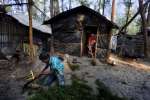 As sea levels rise, Bangladeshis seek higher ground
As sea levels rise, Bangladeshis seek higher ground
Thousands of people in low-lying coastal areas of Bangladesh have already been displaced by climate change and rising sea levels
-
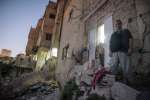 Hope gone in Jordan, Syrian refugees eye risky onward journey
Hope gone in Jordan, Syrian refugees eye risky onward journey
Destitution and despair are forcing Syrian refugees to risk treacherous winter passage to Europe
-
 Building a future through education in Chad
Building a future through education in Chad
Young Sudanese refugees are being integrated into Chad's school system, with the support of UNHCR and Educate A Child Programme.
-
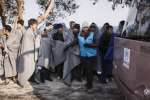 Programme seeks 20,000 places for asylum seekers in Greece
Programme seeks 20,000 places for asylum seekers in Greece
EU Commission and UNHCR programme provides additional reception places for asylum seekers and relocation candidates in Greece through housing subsidies.
-
 New pipeline to bring precious water to Cameroon refugee camp
New pipeline to bring precious water to Cameroon refugee camp
-
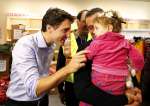 Syrian refugees receive warm welcome in Canada
Syrian refugees receive warm welcome in Canada
A flight with 163 refugees on board arrived in Toronto on December 10 under an initiative that will provide a new life for 25,000 Syrian refugees.
-
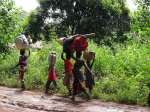 Human Rights Day: Abuses rife in Central African Republic
Human Rights Day: Abuses rife in Central African Republic
Three years after the start of the current wave of violence Central African Republic, insecurity and human rights abuses remain rife, including the forcibly displaced.
-
 Don't give terror groups propaganda says Guterres
Don't give terror groups propaganda says Guterres
UNHCR head warns anti-Muslim rhetoric could backfire and play into hands of extremist groups.
-
 Stabbed 58 times, transgender woman flees El Salvador
Stabbed 58 times, transgender woman flees El Salvador
Neila is among a growing number of lesbian, gay, bisexual, transgender and intersex (LGBTI) people from Central America seeking asylum in Mexico.
-
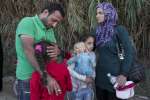 UNHCR says most of Syrians arriving in Greece are students
UNHCR says most of Syrians arriving in Greece are students
Initial survey shows that 78 per cent of Syrian refugees arriving between April-September 2015 were under 35.
-
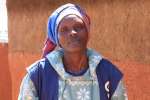 Refugee and sexual violence survivor restores hope in Rwanda
Refugee and sexual violence survivor restores hope in Rwanda
Refugee from Democratic Republic of Congo draws on her experience of sexual and gender based violence to help others in Rwanda overcome abuse
-
 Bay of Bengal boat flow manageable with regional cooperation
Bay of Bengal boat flow manageable with regional cooperation
Study presented at Bangkok special meeting outlines need for coordinated efforts to aid refugees attempting perilous sea crossing in search of safety in South-East Asia.
-
 Thousands flee South Sudan fighting to Democratic Republic of the Congo
Thousands flee South Sudan fighting to Democratic Republic of the Congo
Two UNHCR teams have registered 3,464 newly arrived refugees in areas near the border following clashes between South Sudanese forces and armed groups
-
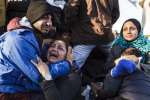 Thousands still at Greek-FYR Macedonia border
Thousands still at Greek-FYR Macedonia border
UNHCR calls on authorities of both countries to manage border in a manner consistent with human rights and refugee-protection principles
